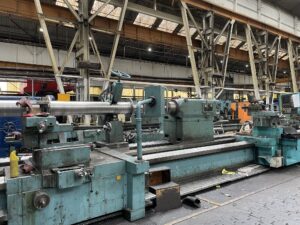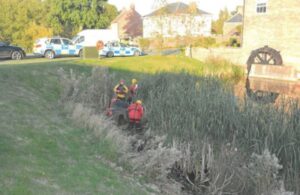Forging company fined over death of employee entangled in lathe
– Nick Hardiman, 54, died after becoming entangled in a lathe while using handheld emery cloth at Somers Forge Limited in Halesowen on 8 December 2023
– HSE found the company failed to prohibit dangerous working practices, prevent access to moving machinery parts, and establish safe operating procedures
– HSE guidance states emery cloth should never be applied directly by hand
A Halesowen forge has been fined £750,000 after an employee sustained fatal injuries when he became entangled in a 20-metre long lathe.
Nick Hardiman was employed by Somers Forge Limited as a machinist at their forge on Prospect Road, Halesowen.
On 8 December 2023, the 54-year-old from Kidderminster was working on a lathe in the machine shop. Whilst using handheld emery cloth to finish a rotating component, Mr Hardiman became entangled in the dangerous moving parts of the lathe, sustaining catastrophic injuries.
Despite the efforts of emergency services, Nick Hardiman sadly died later that evening.

Mr Hardiman leaves behind his partner, Melanie; his siblings Robert, Glenis, Lorraine and David; and his parents Michael and Doreen.
Nick’s siblings Robert, Glenis, Lorraine and David said: “We can’t comprehend how someone can go to work and not come home again. Everyone is absolutely devastated.”
An investigation by the Health and Safety Executive (HSE) found that Somers Forge Limited had failed to:
– prohibit the use of handheld emery cloth on lathes
– prevent access to dangerous moving parts of the lathe
– ensure personal protective equipment (PPE) worn by workers did not create risk of being injured by, or drawn into, the lathe
– undertake a suitable and sufficient risk assessment for the lathe, or establish a safe operating procedure
HSE provides guidance on using emery cloth on metalworking lathes. This guidance establishes that it is never acceptable to apply emery cloth by hand to a rotating component, as there is a risk of the operator becoming entangled or dragged into the danger zone.

Somers Forge Limited pleaded guilty to breaching Section 2(1) of the Health and Safety at Work etc Act 1974. The company was fined £750,000 and ordered to pay £38,314 in costs at Walsall Magistrates’ Court on 18 February 2026.
Nick’s partner Melanie said: “Nick had everything to live for – a loving home and a partner who adored him, family and friends, and a fulfilling life ahead of him. We used to have a life; now I just exist.
I will forever miss the sound of his voice, the smell of his aftershave, the feel of his cuddles and kisses, and the times we would spend together.”
Nick’s father Michael said: “We feel very proud when we speak about Nick, but it really hurts to talk. We think about Nick every single day.”
HSE Inspector Sophie Neale said: “This was an entirely preventable incident which has had tragic consequences.
Employers must ensure that safe systems of work are in place and that workers are not exposed to foreseeable risks from dangerous machinery.
My thoughts are with Nick’s family and friends.”
This prosecution was brought by HSE enforcement lawyer Chloe Ward, and paralegal officer Stephen Grabe.
Further Information
1. The Health and Safety Executive (HSE) is Britain’s national regulator for workplace health and safety. We are dedicated to protecting people and places, and helping everyone lead safer and healthier lives.
2. More information about the legislation referred to in this case is available.
3. Further details on the latest HSE news releases are available.
4. Relevant guidance can be found here Using emery cloth on metalworking lathes – HSE
5. HSE does not pass sentences, set guidelines or collect any fines imposed. Relevant sentencing guidelines must be followed unless the court is satisfied that it would be contrary to the interests of justice to do so. The sentencing guidelines for health and safety offences can be found here.




